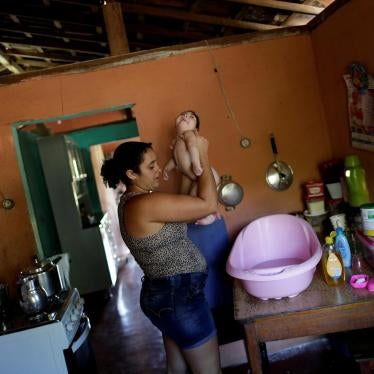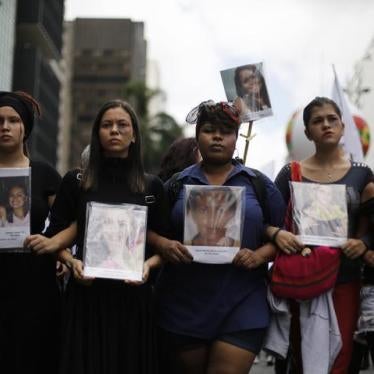I met Taise Campos, a 38-year-old schoolteacher, last February, when I traveled with a Human Rights Watch colleague to Roraima to try to understand the state’s off-the-charts rate of killings of women.
Taise’s life changed radically 11 years ago when her husband started drinking and became aggressive. He verbally abused her, calling her a “bitch,” a “vagabond,” and the “devil.” Then it escalated. He broke religious images and other objects that were dear to her. He also beat her in front of their two children, “always kicking [me] in places that were not visible,” Taise told us. He threatened her, saying: “You are not protected. You can be shot at any time. It may take 10, 15, 20 years, but one day I’ll kill you.”
All of his actions are forms of domestic violence—the physical abuse, the psychological abuse, and the threats. And it usually happens repeatedly, in what is called “the cycle of violence”—a cycle of abuse and periods of calm that makes it difficult for women to first recognize what’s happening and respond to it. In Taise’s case, the abuse was sporadic at first, followed by expressions of regret from her abuser, asking for forgiveness and promising it would end. “The violence began bit by bit, then it happened every month, then every week, afterward every day, and later it happened any time,” she said.
For many years, Taise never filed a police report.
Roraima is the deadliest state for women and girls in Brazil. Killings of women rose 139 percent from 2010 to 2015 there, reaching 11.4 homicides per 100,000 women that year, the latest for which there is data available. The national average is 4.4 killings per 100,000 women—already one of the highest in the world. And the problems we found with protecting women in Roraima from abuse are symptomatic of the failure to protect women nationwide. Studies in Brazil and worldwide estimate that a large percentage of women who suffer violent deaths are killed by partners or former partners.
Why is it difficult for women to report domestic violence? They may want to avoid the experience of sharing and reliving their traumatic story—an experience Taise described as “feeling so exposed that you feel naked.” Or they may fear facing unfounded counter-accusations that compound the feelings of shame, like those Taise later got from police officers: “What did you do to make him behave that way?” or “Aren’t you provoking him?”
Very often, the main reason is simply that they have no faith that reporting the violence to police will change anything—authorities won’t really protect them, nor will they investigate and prosecute their abusers.
Sometimes, though, women do overcome these barriers. Taise did finally summon the courage to go to the authorities. She filed more than 15 police reports over the years and provided evidence to support her complaints. She left her cell phone at the civil police station for analysis—for a year and a half. Yet the statute of limitations has expired on each crime she reported, with no results.
Taise’s case is in no way unique. In Roraima, we documented 31 cases of domestic violence. We found that many women do not report violence, or suffer abuse for months or years before going to authorities. When they do overcome odds and go to the police, the response is dreadful, as we showed in our recent report, “One Day I’ll Kill You.”
We found a long list of failures in the way the state handles domestic violence cases. Military police lack sufficient personnel to respond to all emergency calls. Some civil police officers decline to register domestic violence complaints or to ask judges for protection orders. Instead, they direct victims to the single “women’s police station” in the state—which specializes in crimes against women—even at times when that station is closed.
Women in Roraima must tell their story of abuse, including sexual abuse, in open reception areas where their confidentiality is not protected and the risk of stigma and traumatization is high, as no police station in the state has private rooms to take statements. Civil police officers who handle domestic violence cases get no specific training to interview victims or prepare reports in these sensitive and traumatic cases. Most cases languish for years without investigation until they are eventually closed because the statute of limitations on the crime expires, without any prosecution.
But these problems are not confined to Roraima. Brazil has a comprehensive legal framework to prevent domestic violence and ensure justice, under the 2006 “Maria da Penha” law, named after a domestic abuse victim who took her case to a regional court. But the law has yet to be fully implemented throughout the country.
Although some Roraima officials showed a remarkable commitment to help women, the Brazilian authorities need to do much more.
The federal government should start by taking its international obligations toward women more seriously. Brazil has not yet submitted its eighth report to the UN committee that evaluates compliance with the Convention on the Elimination of All Forms of Discrimination Against Women (CEDAW). Brazil’s report is 17 months overdue. The report should acknowledge the enormous problems Brazil faces to address domestic violence. It should commit Brazil to reduce barriers for women to file complaints with the police, ensure that cases are properly investigated and prosecuted and protective orders issued by judges are adequately monitored, and allocate sufficient resources to train police officers in how to handle these cases humanely and effectively and to punish them if they fail to comply with their obligations.
Taise had a message for other domestic violence victims: “I know you are scared. I know you feel ashamed… And that you want, somehow, to protect your family. But remember that the first person you need to protect is yourself.”
For that, all the Taises out there need a commitment from Brazilian authorities to ensure a functional justice system that can provide the protection mechanisms and justice that they now largely have only on paper.









